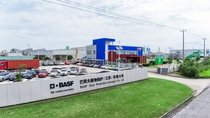Agriculture
Rudong becomes BASF Agricultural Solutions’ first CO2-emission-free production site
- Site operates fully on renewable energy, contributing to BASF’s 2050 Net Zero Target
- Rudong site to switch from fossil-based steam to renewable energy for its heating system
- BASF to procure renewable energy via a long-term agreement from local energy company
The BASF production site in Rudong, China has reduced CO2 emissions to zero1 by modifying its existing site heating system from steam to electricity generated from renewable energy. As a result, the facility in the Chinese province of Jiangsu is the first site of BASF’s Agricultural Solutions segment to be CO2 emission-free1.
Since 2021, the Rudong site switched to electricity from renewable energy sources, making steam the largest contributor to the site’s CO2 emissions. In June 2024, the existing steam heating system was decommissioned and fully replaced with a renewable energy supply. The result of which is an additional CO2 emission reduction of around 1,100 tons per year. Along with achieving zero CO2 emissions in Rudong, BASF has also signed an agreement with a local electricity supplier to ensure a long-term supply of renewable energies to power the site.
“The achievement in Rudong underlines our determination to deliver on the demand of our customers and society for low-emission, high-quality crop protection products,” said Christian Aucoin, Senior Vice President Global Operations at BASF Agricultural Solutions. “It is a major step to transform traditional manufacturing processes, living up to our sustainability commitments in agriculture.”
In Rudong, BASF Agricultural Solutions formulates crop protection products for China and other markets in the Asia-Pacific region. By producing without emitting CO2 (Scope 1 and 2), the site contributes to reducing BASF’s corporate carbon footprint – per the company's target of 25% reduction in Scope 1 and 2 emissions by 2030 compared to 2018 and helps meet its overall ambitions of achieving net zero CO2 emissions globally by 2050 (Scopes 1, 2, 3.1). (Read more) BASF has published a comprehensive corporate carbon footprint since 2008, the only industrial enterprise worldwide to do so.
1 Scope 1 & 2. For more information, refer to BASF corporate carbon footprint here
About BASF’s Agricultural Solutions Division
Everything we do, we do for the love of farming. Farming is fundamental to provide enough healthy and affordable food for a rapidly growing population, while reducing environmental impacts. That’s why we are working with partners and experts to integrate sustainability criteria into all business decisions. With €900 million in 2023, we continue to invest in a strong R&D pipeline, combining innovative thinking with practical action in the field. Our solutions are purpose-designed for different crop systems. Connecting seeds and traits, crop protection products, digital tools and sustainability approaches, to help deliver the best possible outcomes for farmers, growers and our other stakeholders along the value chain. With teams in the lab, field, office and in production, we do everything in our power to build a sustainable future for agriculture. In 2023, our division generated sales of €10.1 billion. For more information, please visit
www.agriculture.basf.com or our social media channels.
About BASF
At BASF, we create chemistry for a sustainable future. We combine economic success with environmental protection and social responsibility. Around 112,000 employees in the BASF Group contribute to the success of our customers in nearly all sectors and almost every country in the world. Our portfolio comprises six segments: Chemicals, Materials, Industrial Solutions, Surface Technologies, Nutrition & Care and Agricultural Solutions. BASF generated sales of €68.9 billion in 2023. BASF shares are traded on the stock exchange in Frankfurt (BAS) and as American Depositary Receipts (BASFY) in the United States. Further information at www.basf.com.

